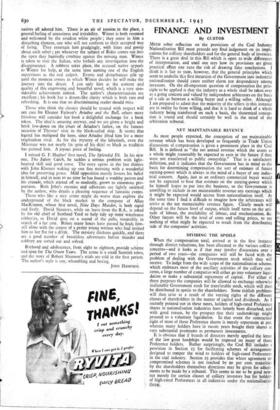FINANCE AND INVESTMENT
By CUSTOS Mum sober reflection on the provisions of the Coal Industry Nationalisation Bill must precede any final judgement on its impli- cations for colliery shareholders and for the general body of investors. There is a great deal in this Bill which is open to wide differences of interpretation, and until one sees how its provisions are given practical effect one runs the risk of drawing false conclusions. I think it is fair to state, however, that the general principles which seem to underlie this first incursion of the Government into industrial nationalisation should cause neither alarm nor despondency among investors. On the all-important question of compensation the prin- ciple to be applied is that the industry as a whole shall be taken over as a going concern and valued by independent arbitrators on the basis of a sale as between a willing buyer and 'a willing seller. Although I am prepared to admit that the majority of the sellers in this instance are in reality far from willing, and that it is hard to think of a whole industry being transferred on such a basis, the theoretical concep- tion is 'sound and should certainly be well in the mind of the arbitration tribunal.
NET MAINTAINABLE REVENUE As most people expected, the conception of net maintainable revenue which has been developed so frequently in Trade Union discussions of compensation is given a prominent place in the Coal Bill. It is defined as " the net annual revenue which the assets as a whole might reasonably be expected to earn in 'the future if they were not transferred to public ownership." That is a satisfactory definition, and it indicates that the Government has in mind as the basis for determining compensation the sort of estimate of future earning-power which is always in the mind of a buyer of any indus- trial concern. Again, just as an ordinary commercial buyer would not be expected to base that estimate on the earning-power which he himself hopes to put into the business, 'so the Government is unwilling to include in net maintainable revenue any earnings which it might be expected would 'accrue from nationalisation itself. At the same time I find it difficult to imagine how the arbitrators will arrive at the net maintainable revenue figure. Clearly much will depend on the future level of output, which itself turns on the atti- tude of labour, the availability of labour, and mechanisation, &c. Other factors will be the level of costs and selling prices, to say nothing of what might be expected to result from the distributing side of the companies' activities.
DIVIDING THE SPOILS When the compensation total, arrived at in the first • instance through district valuations, has been allocated to the various colliery concerns—and it looks as if that may involve discussions over a period of two years—the companies will still be faced with the problem of dealing with the Government stock which they will receive. To judge from the wide scope of the nationalisation scheme, which embraces most of the ancillary activities of the colliery con- cerns, a large number of companies will either go into voluntary liqui- dation or make a substantial repayment of capital. For either of these purposes the companies will be allowed to exchange otherwise inalienable Government stock for transferable stock, which will then be distributed in specie to the shareholders. Some ticklish problems will then arise as a result of the varying rights of the different classes of shareholders in the matter of capital and dividends. As I recently pointed out in these notes, holders of high-rated Preference shares in nationalisation industries have latterly been disturbed, and with good reason, by the prospect that their undertakings might proceed to a voluntary liquidation. In that event the contractual right of most of these Preference shares is merely repayment at par. whereas many holders have in recent years bought their shares at very substantial premiums as permanent investments.
It is obvious that if boards of directors merely applied the letter of the law great hardships would be imposed on many of these Preference holders. Rather surprisingly, the Coal Bill includes a provision in Section 23 for facilitating schemes of arrangement designed to temper the wind to holders of high-rated Preferences in the coal industry. Section 23 provides that where agreement or compromised schemes is not reached by 90 per cent. majoritie• by the shareholders themselves directions may be given for adjust- ments to be made by a tribunal. This seems to me to be good news not merely for certain classes of colliery investors but for holden of high-rated Preferences in all industries under the nationalisatior threat.






























 Previous page
Previous page